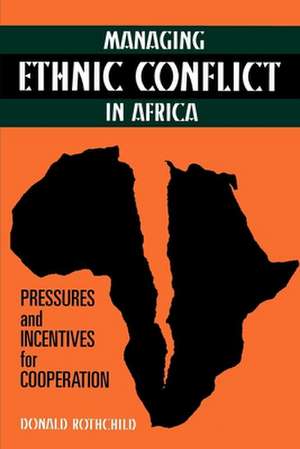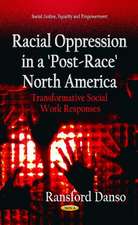Managing Ethnic Conflict in Africa: Pressures and Incentives for Cooperation
Autor Donald Rothchilden Limba Engleză Paperback – sep 1997
Ethnic conflict in Africa is reaching critical levels. Governments are being toppled. National economies are collapsing. And the potential for civil unrest--even violent encounters--throughout the continent threatens to engulf not only Africa, but much of the world.
Africa's salvation depends on the development and implementation of effective institutions of ethnic conflict management. In this book, Donald Rothchild analyzes the successes and failures of attempts at conflict resolution in different African countries and offers comprehensive ideas for successful mediation.
To provide a clear picture of the current situation, Rothchild traces Africa's ethnic unrest back to its beginnings during the period of colonial rule, through the post-independence era, when governments built the institutions of government control and consolidated power; and into its more recent period when it is possible to discern greater democratic governance.
Managing Ethnic Conflict in Africa demonstrates how negotiation and mediation can promote conflict resolution and a political environment that fosters economic development. It offers a compelling case for the use of both political incentives (power sharing, elections, and fiscal programs) and a variety of actions (including principles of inclusiveness, coercion, and punishment) to support reconciliation. This "carrot and stick" approach can be employed by a state to promote increased political bargaining while maintaining stability, and by outside intermediaries to cope with conflict brought on by the breakdown of domestic regimes.
Africa's salvation depends on the development and implementation of effective institutions of ethnic conflict management. In this book, Donald Rothchild analyzes the successes and failures of attempts at conflict resolution in different African countries and offers comprehensive ideas for successful mediation.
To provide a clear picture of the current situation, Rothchild traces Africa's ethnic unrest back to its beginnings during the period of colonial rule, through the post-independence era, when governments built the institutions of government control and consolidated power; and into its more recent period when it is possible to discern greater democratic governance.
Managing Ethnic Conflict in Africa demonstrates how negotiation and mediation can promote conflict resolution and a political environment that fosters economic development. It offers a compelling case for the use of both political incentives (power sharing, elections, and fiscal programs) and a variety of actions (including principles of inclusiveness, coercion, and punishment) to support reconciliation. This "carrot and stick" approach can be employed by a state to promote increased political bargaining while maintaining stability, and by outside intermediaries to cope with conflict brought on by the breakdown of domestic regimes.
Preț: 207.55 lei
Nou
Puncte Express: 311
Preț estimativ în valută:
39.72€ • 41.31$ • 32.79£
39.72€ • 41.31$ • 32.79£
Carte tipărită la comandă
Livrare economică 14-28 aprilie
Preluare comenzi: 021 569.72.76
Specificații
ISBN-13: 9780815775935
ISBN-10: 0815775938
Pagini: 360
Ilustrații: Illustrations, maps
Dimensiuni: 152 x 229 x 23 mm
Greutate: 0.54 kg
Ediția:New.
Editura: Brookings Institution Press
Colecția Brookings Institution Press
ISBN-10: 0815775938
Pagini: 360
Ilustrații: Illustrations, maps
Dimensiuni: 152 x 229 x 23 mm
Greutate: 0.54 kg
Ediția:New.
Editura: Brookings Institution Press
Colecția Brookings Institution Press
Notă biografică
Donald Rothchild is professor of political science at the University of California, Davis. He is the coauthor of Sovereignty as Responsibility: Conflict Management in Africa (Brookings, 1996), author of Racial Bargaining in Independent Kenya (Oxford University Press, 1973), and coeditor of The International Spread of Ethnic Conflict: Fear, Diffusion, and Escalation (Princeton).
Descriere
Ethnic conflict in Africa is reaching critical levels. Governments are being toppled. National economies are collapsing. And the potential for civil unrest--even violent encounters--throughout the continent threatens to engulf not only Africa, but much of the world.
Africa's salvation depends on the development and implementation of effective institutions of ethnic conflict management. In this book, Donald Rothchild analyzes the successes and failures of attempts at conflict resolution in different African countries and offers comprehensive ideas for successful mediation.
To provide a clear picture of the current situation, Rothchild traces Africa's ethnic unrest back to its beginnings during the period of colonial rule, through the post-independence era, when governments built the institutions of government control and consolidated power; and into its more recent period when it is possible to discern greater democratic governance.
Managing Ethnic Conflict in Africa demonstrates how negotiation and mediation can promote conflict resolution and a political environment that fosters economic development. It offers a compelling case for the use of both political incentives (power sharing, elections, and fiscal programs) and a variety of actions (including principles of inclusiveness, coercion, and punishment) to support reconciliation. This "carrot and stick" approach can be employed by a state to promote increased political bargaining while maintaining stability, and by outside intermediaries to cope with conflict brought on by the breakdown of domestic regimes.
Africa's salvation depends on the development and implementation of effective institutions of ethnic conflict management. In this book, Donald Rothchild analyzes the successes and failures of attempts at conflict resolution in different African countries and offers comprehensive ideas for successful mediation.
To provide a clear picture of the current situation, Rothchild traces Africa's ethnic unrest back to its beginnings during the period of colonial rule, through the post-independence era, when governments built the institutions of government control and consolidated power; and into its more recent period when it is possible to discern greater democratic governance.
Managing Ethnic Conflict in Africa demonstrates how negotiation and mediation can promote conflict resolution and a political environment that fosters economic development. It offers a compelling case for the use of both political incentives (power sharing, elections, and fiscal programs) and a variety of actions (including principles of inclusiveness, coercion, and punishment) to support reconciliation. This "carrot and stick" approach can be employed by a state to promote increased political bargaining while maintaining stability, and by outside intermediaries to cope with conflict brought on by the breakdown of domestic regimes.





